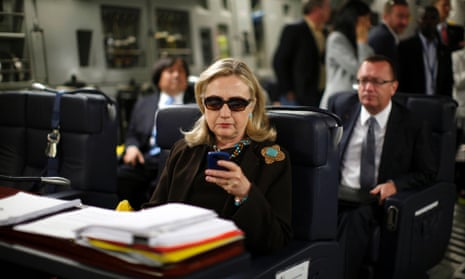As a young lawyer in Arkansas, Hillary Clinton came across an advice column on how to decorate your first office.
If you are a man, pepper it with pictures of your family, the male writer advised: “Everyone will know you’re a responsible, reliable family man.”
But if you’re female and you have your own office? “Don’t have any pictures of your family. Because then they think you won’t be able to concentrate on your work,” she said, to a laughing audience at a 2014 women in leadership summit.
A Pew Research Center survey confirms that lopsided attitudes about gender from Clinton’s years in Arkansas persist even now, in 2015.
Forty-three percent of the people who responded to the Pew survey said that women in top executive positions are held to higher standards than men. A substantial 38% believed that the high standards extended to women in public office.
The survey polled 1,835 people, roughly half of whom were men, on the barriers to women taking up top positions in business and politics.
In politics, 37% of respondents felt that America was simply not ready to elect female leaders. That number rose to 43% when they were asked about female leaders in corporate America.
A third reason women have been held back in politics, according to 27% of those polled, was that women often lacked party connections and support. For business leaders, the third most-pressing problem, 23% said, was dealing with family responsibilities.
Twenty-four percent of male respondents felt that women were better off not having children if they wanted to get ahead in their careers. Twenty percent of women polled shared that thought.
Some attitudes were surprising: 34% and 31% of all respondents believed that women were better at being honest and ethical in politics and business, respectively, while only 3% believed men were better. However, 34% of respondents believed men were more willing to take risks, while only 5% of respondents said that applied to women.
A majority of respondents, however, believed that gender made no difference in such issues.

The survey on Americans’ attitudes to women in leadership comes alongside Sheryl Sandberg and Adam Grant’s op-ed in the New York Times on why women tend to stay quiet in meetings.
Sandberg and Grant write of young female writers on the TV show The Shield who would keep quiet during story meetings. To the show’s producer Glenn Mazarra’s suggestion that they speak up, the response was:
“Watch what happens when we do.”
Mazarra, Sandberg and Grant write, noticed that every time the women spoke in meetings, they were always interrupted by male writers, shot down, or their ideas hijacked by aggressive male voices – what Time magazine dubbed “manterrupting” and “bropropriation”.
Succour was found only when the producer introduced a “no-interruption rule”, noting that the team became far more effective when everyone could exchange ideas without getting in the women’s way.
Sandberg, Facebook’s COO and the author of Lean In, teams with Wharton professor Grant to describe how women speak less in meetings not only because they are often “manterrupted”, but also because, evidence suggests, women are actively punished for making themselves heard.
Yale University’s Victoria Briscoll found that experienced and powerful male senators spoke more than their juniors on the Senate floor. But experience and power did not correlate with more speaking time for female senators. In her research, Briscoll also noted that loquacious male leaders got 10% higher ratings than their peers in the same organization, while female executives got 14% lower ratings than their peers if they spoke more.
Nothing explains these numbers better than Hillary Clinton’s remarks from the summit last summer. When asked if there was indeed a double standard for women holding public office in the media, Clinton, sitting next to IMF chief Christine Lagarde, rolled her eyes before saying: “There is a double standard, obviously. There is a deep set of cultural, psychological views that are manifest through this double standard.”
And if they persist even in this open, transformational society, she emphasised to the interviewer, “you know how deep they are.”

Comments (…)
Sign in or create your Guardian account to join the discussion